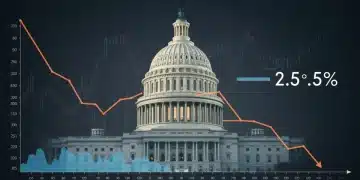U.S. resumes trade talks post digital tax pause

The U.S. resumes trade talks post digital tax pause, aiming for improved international trade relations, increased market access, and potential economic growth while navigating risks of disputes.
U.S. resumes trade talks post digital tax pause, signaling a critical shift in international relations. Are you curious about what this means for businesses and economies worldwide? Let’s dive into the details.
Overview of the digital tax pause impact
The digital tax pause has created ripples across global markets. Understanding its implications is crucial for businesses and policymakers alike. As the U.S. resumes trade talks, the pause provides a unique opportunity for reassessment.
Impact on International Relations
Countries that implemented digital taxes often found themselves at odds with the U.S. This pause allows these nations to reconsider their strategies without the immediate pressure of negotiations. By stepping back, stakeholders can foster healthier dialogues and potentially reach more balanced agreements.
Economic Ramifications
The pause in digital taxation could lead to economic benefits, particularly for tech companies facing tariffs. It provides a chance for economies that heavily depend on technology to flourish while inviting new investments. Here are some notable outcomes:
- Increased collaboration among tech firms.
- Potential for tax reforms in various countries.
- Improved trade relations reducing barriers.
As businesses navigate these changes, adaptations in operational strategies are essential. Companies should remain agile and explore new markets opened up by these shifts.
Future Trade Policies
What lies ahead for international trade? Through the pause, there’s a possibility of establishing fairer trade policies. Collaboration among nations can lead to a cohesive approach towards digital taxation, focusing on mutual benefits rather than conflicts. Companies that position themselves to take advantage of these emerging opportunities will thrive.
Key players in U.S. trade negotiations

Understanding the key players in U.S. trade negotiations is essential for grasping how international relations may evolve. Various stakeholders influence the outcomes, each playing a pivotal role in shaping trade policies.
Government Officials
High-ranking officials within the U.S. government, such as the President and the Secretary of Commerce, are critical to trade negotiations. Their positions allow them to direct the negotiation strategies and set national priorities. Other important figures include members of Congress, who may support or challenge proposed trade agreements.
Business Representatives
Another significant group in these negotiations is business leaders and lobbyists. They provide insights into how trade policies affect their industries. Companies can advocate for terms that benefit their sectors, and their input helps shape realistic agreements. Some key representatives include:
- Executives from major technology firms.
- Leaders in agriculture and manufacturing.
- Trade association representatives.
Their collaboration with the government can lead to effective strategies that promote U.S. interests globally.
International Partners
Trade agreements are not made in isolation. Countries involved in negotiations also have their key players, including diplomats and trade ministers. Their perspectives and priorities can greatly influence the terms being discussed. Navigating these interests requires skillful diplomacy and mutual understanding.
As talks progress, the dynamics among these players will continue to evolve, creating opportunities for adjustment and compromise. Keeping track of these individuals is crucial for anyone looking to understand the broader trade landscape.
Future implications for global trade policies
The future implications for global trade policies are significant, particularly in light of recent developments such as the U.S. resuming trade talks. These negotiations can reshape the landscape of international commerce, affecting various sectors worldwide.
Potential Changes in Trade Agreements
As countries reassess their positions, we may see new trade agreements emerge. The focus could shift to agreements that emphasize sustainability and digital commerce. In this context, it is vital to consider the potential for enhanced cooperation among nations.
- Increased focus on environmental standards.
- Development of digital trade frameworks.
- Negotiations that prioritize fair labor practices.
Such changes can lead to more equitable conditions for businesses globally.
Economic Shifts
Global economies are also poised to undergo transformations. As countries adapt to new trade rules, businesses must remain agile to respond to changes. Industries like technology and agriculture could experience both challenges and new opportunities as policies evolve.
Understanding these economic shifts is crucial for stakeholders aiming to stay ahead of the curve. With tariffs and trade barriers becoming dynamic elements of the discussion, companies will need to adopt flexible strategies.
The Role of Multilateral Organizations
Multilateral organizations, such as the World Trade Organization (WTO), will play a crucial role in shaping future policies. Their involvement can help mediate disputes and promote collaborative approaches among nations. This support is vital for ensuring that trade remains fair and inclusive as relationships shift.
Overall, as we look toward the future, the continued evolution of global trade policies will require close attention from policymakers and businesses alike. Keeping an eye on these developments can help maximize opportunities and mitigate risks in an interconnected world.
Potential outcomes of resumed talks

The potential outcomes of resumed talks are diverse and can significantly impact international trade. As the U.S. re-engages in negotiations, various scenarios could unfold, influencing markets and industries across the globe.
Improved Trade Relations
One likely result is the strengthening of trade relations between the U.S. and other nations. As dialogue resumes, countries may find common ground on key issues. This cooperation can lead to reduced tariffs and the establishment of clearer rules for trade. Enhanced partnerships will encourage investment and growth.
Increased Market Access
Resumed talks may also open doors for improved market access. Countries could negotiate terms that allow U.S. businesses to enter foreign markets more easily. This could benefit various sectors, particularly technology and agriculture, paving the way for:
- New business opportunities.
- Expansion of companies into previously inaccessible markets.
- Increased competition that drives innovation.
Such developments can invigorate the economy and lead to job creation in several industries.
Unforeseen Challenges
However, not all outcomes are positive. Challenges may arise as negotiations unfold. Stakeholders must remain vigilant about potential trade disputes that could emerge. These disputes might stem from differing priorities among negotiating countries. It is important to be prepared for the complexities that come with international agreements.
Monitoring the progress of talks will be essential to understanding the broader implications for global trade. As nations navigate these discussions, adaptability will be key for businesses aiming to thrive in a changing landscape.
The future of U.S. trade negotiations holds great promise but also potential challenges. As countries engage in dialogue, they may uncover opportunities for better cooperation and understanding. The resumed talks could lead to improved trade relations, increased market access, and significant economic benefits. However, stakeholders must remain aware of the possible disputes that may arise. By staying informed and adaptable, businesses can navigate this evolving landscape and make the most of the changing trade environment.
FAQ – Frequently Asked Questions about U.S. Trade Talks
What are the potential benefits of resumed trade talks?
Resumed trade talks may lead to improved trade relations, increased market access, and economic growth for various sectors.
How might trade negotiations affect small businesses?
Small businesses could benefit from easier access to international markets and by adapting to new trade policies that favor their interests.
What risks could arise from international trade negotiations?
There could be potential challenges such as trade disputes and differing national priorities that might complicate agreements.
How important is multinational cooperation in trade agreements?
Multinational cooperation is crucial as it fosters collaboration, resolves conflicts, and leads to fairer trade practices globally.





